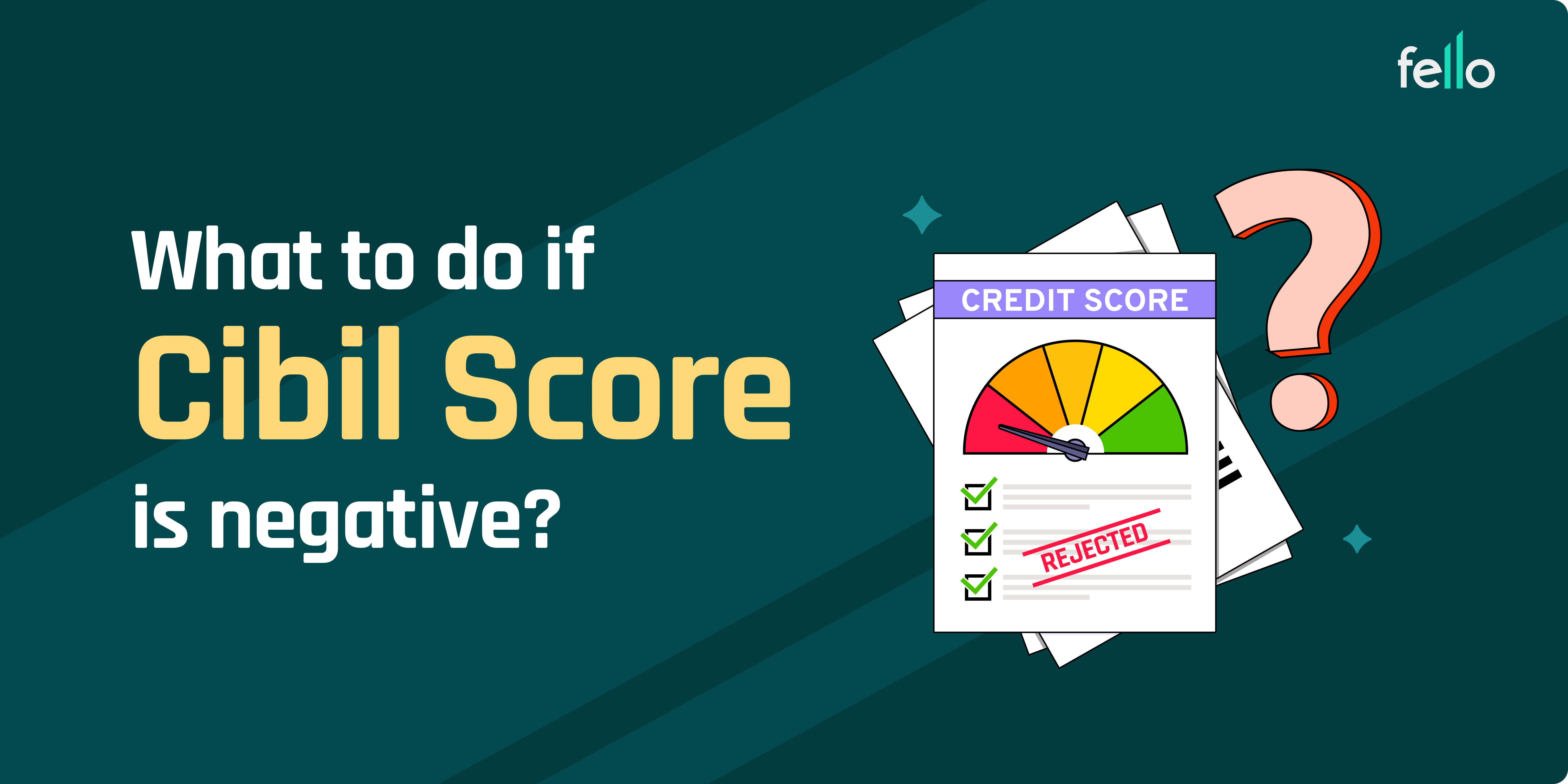Did you know that nearly 80% of loan rejections in India are due to a low or negative CIBIL score? If you’re facing challenges because of your credit score, you’re not alone. But what exactly is a CIBIL score, and what to do if CIBIL score is negative? In this blog, we’ll explore the steps you can take to improve your score and regain financial stability.
What Is a CIBIL Score?
A CIBIL score is a three-digit number ranging from 300 to 900 that reflects your credit health. It is calculated based on your:
- Payment History: How consistently you repay loans or credit card bills.
- Credit Utilisation Ratio: The amount of credit used compared to your total credit limit.
- Length of Credit History: How long you’ve been using credit.
Key highlights about CIBIL scores:
- 900 is the highest possible score, signifying excellent credit health.
- A score below 750 often results in challenges like loan or credit card rejection.
- Negative or zero scores indicate insufficient or poor credit history.
Understanding your score is crucial to tackling financial challenges and regaining control of your credit profile. Check out here what is a credit score and why is it important?
How to Check Your CIBIL Score for Free?
If you’re uncertain about your CIBIL score, here’s how to check it for free:
- Visit Authorized Platforms: Go to the official CIBIL website or trusted financial portals.
- Register Your Details: Provide personal and financial information to create an account.
- Access the Free Option: Look for free credit report options or pay a small fee for a detailed analysis.
- Use Financial Advisory Sites: Many advisory platforms guide users on how to check their CIBIL scores online.
Also check out our comprehensive guide on how to check CIBIL score for free?
CIBIL Credit Score Range
Below is a breakdown of CIBIL credit scores and what they mean:
| CIBIL Score | Meaning |
| Zero (0) | No credit activity reported |
| Negative (-1) | No credit history available |
| 800+ | Excellent creditworthiness |
| 740–799 | Very good credit health |
| 670–739 | Good but needs improvement |
| 580–669 | Fair, prone to risks |
| 350–579 | Very poor, high-risk zone |
Why Is Your CIBIL Score Negative or Zero?
To fix a negative CIBIL score, you must first identify the root causes. Common reasons include:
- Missed or Delayed Payments: Late payments impact your score significantly.
- High Credit Utilisation: Overusing your credit limit reflects poor financial discipline.
- Errors in Credit Report: Inaccuracies or discrepancies can lower your score.
- Lack of Credit History: Having no loans or credit cards results in an insufficient credit record.
What to Do If CIBIL Score Is Negative?
Improving a negative or zero CIBIL score requires a disciplined and strategic approach. Here’s what you can do:
1. Dispute Errors in Your Credit Report
- Review your credit report regularly for inaccuracies.
- If you find errors, dispute them by contacting CIBIL directly.
- Provide necessary documents to correct discrepancies.
2. Clear Outstanding Debts
- Pay off overdue loans and credit card bills.
- Focus on high-interest or long-standing debts first.
- Negotiate with lenders if full repayment is challenging.
3. Maintain a Low Credit Utilisation Ratio
- Limit your credit card usage to below 30% of your credit limit.
- This signals responsible financial management.
4. Use a Secured Credit Card
- Get a secured credit card backed by a fixed deposit.
- Make timely payments to slowly rebuild your score.
5. Avoid Multiple Loan Applications
- Refrain from applying for multiple loans simultaneously.
- Multiple applications can signal financial instability to lenders.
Quick Actions to Improve a Negative CIBIL Score
| Action | Impact | Timeframe |
| Dispute Errors | Immediate impact | 30–60 days |
| Clear Outstanding Debts | High | 1–6 months |
| Maintain Low Credit Usage | Moderate | 1–3 months |
| Use Secured Credit Cards | Moderate | 3–12 months |
| Avoid Multiple Applications | Low | Immediate |
Conclusion
A negative CIBIL score can feel like a financial roadblock, but it’s far from the end of the road. By disputing errors, clearing outstanding debts, and adopting healthy financial habits, you can gradually rebuild your creditworthiness. Stay proactive by checking your CIBIL score regularly and monitoring your progress. With patience and discipline, you’ll be on your way to securing a strong financial future.
Frequently Asked Questions
What is a negative CIBIL score?
A negative CIBIL score indicates no credit history or poor financial behavior, such as missed payments.
How can I check my credit score online?
Visit the official CIBIL website or authorized platforms, register your details, and access your score.
Can I improve my CIBIL or credit score quickly?
While improvements take time, disputing errors and clearing debts can have an immediate impact.
Does a secured credit card improve a CIBIL score?
Yes, using a secured credit card responsibly helps rebuild your credit profile over time.
What happens if I have no credit history?
Lenders may hesitate to approve loans. Building credit using a secured credit card is a good starting point. Check out here, how to build a credit score.
Why does my credit report have errors?
Errors can occur due to inaccurate reporting by lenders or technical glitches. Always verify your credit report.

